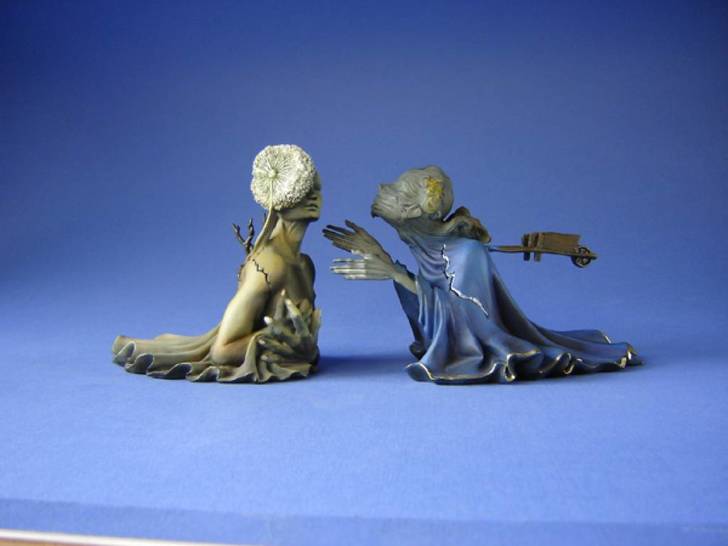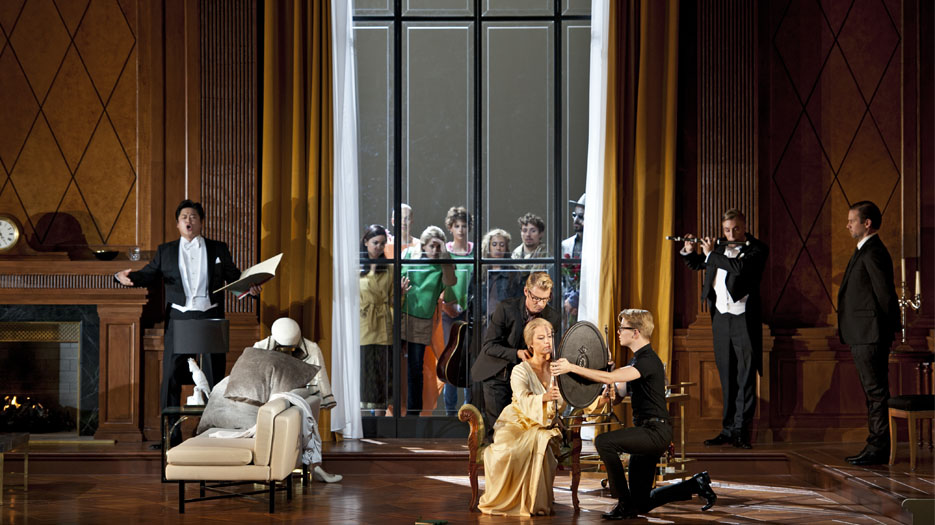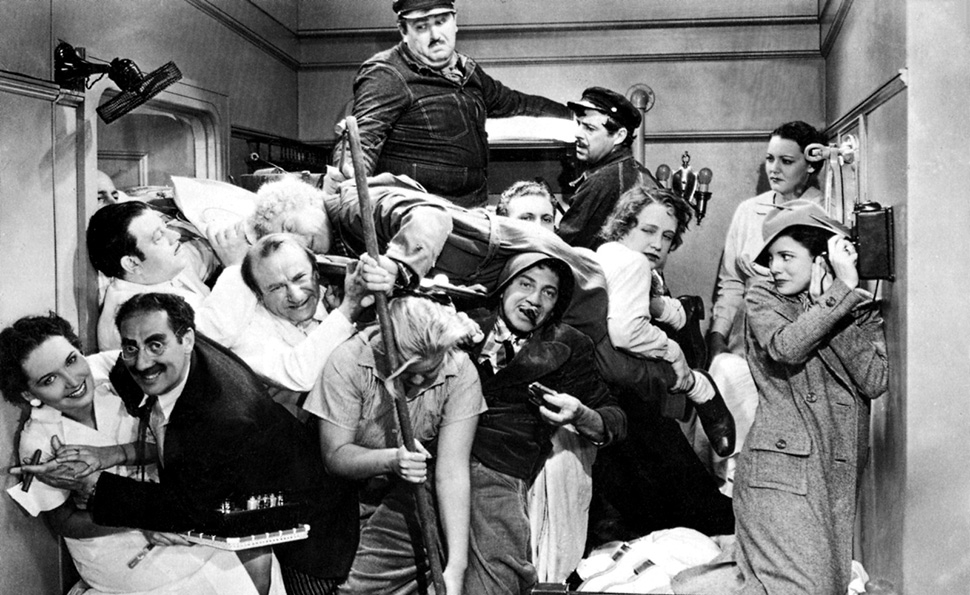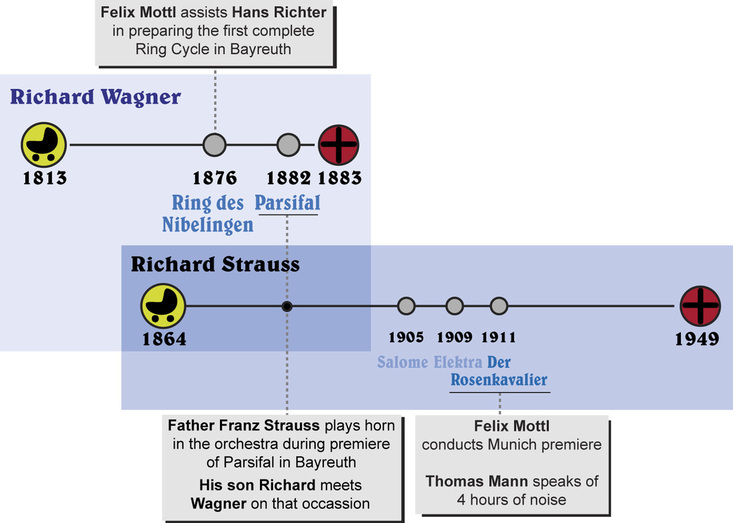|
In last weeks Rosenkavalier it took a fully staged production, in which everything fell into place, to won me over for this opera. I didn't need to be convinced about Tristan und Isolde. Several recordings (Furtwängler, Böhm and Kleiber to name but a few) already did the job before I went to see the concert performance with Jaap van Zweden and the Nederlands Radio Philharmonic Orchestra in the Concertgebouw in Amsterdam. With conductor and orchestra, already responsible for unbelievable beautiful renditions of Lohengrin and Parsifal in this venue, succes was almost garanteed. Wagner wrote Tristan und Isolde as an opera that could be performed with a minimum of theatrical means. Stuck in the second act of Siegfried, with the end of his Nibelungen-cycle nowhere in sight, it was made in order to make some money. It seems fit therefore to perform it in a concert hall without stage props. And Wagner's music is illusive enough. With a concert performance you don't run a risk that a staging build on poor choices collides with your own imagination when you walk through the cathedral of sound Wagner erected for the ill-fated love between Tristan and Isolde. What is missed in staging and acting has to come from orchestra and singers alone. You known when you are in a good live performance when you stop comparing it to the discography that is in your head. The discography of Isolde I carry with me harbours the voices of Flagstad, Nilsson, Price and Stemme. And in their company the Isolde from Jennifer Wilson is not the most seductive one I know. Her voice his big enough, perhaps with some hard edges in the higher register, but by the time she arrives at her moment of transformation, Die Liebestod, she shines in all her glory. She manages to silence the voices of the past that are on my mind. In the week before this performance two singers fell ill. King Marke was originally meant to be sung by Matthias Goerne. A singer who worked with Van Zweden in this hall before and delivered a beautiful Schubert on that occasion. He was replaced by Falk Struckman. A powerful King Marke, strong and not too subtle. The loudest voice of the set. And Clifton Forbis, who was suposed to sing Tristan, even fell ill one day before the concert. Ian Storey came to the rescue and saved this event from being canceled. He did not had one rehearsal with the orchestra. Thus adding a new dimension to the term Heldentenor. But he is not the biggest voice and his Tristan was perhaps a little to small-voiced for this Isolde. In his third act monologue it seemed like he was short of stamina, not out-of-character for someone who is mortally wounded, but I found his performance a very satisfying one nonetheless. He did not overreach, perhaps would have be in somewhat better shape if he would have had time to prepare for this occasion, and sang a sensitive Tristan. I own a DVD with him, Waltraud Meier and Daniel Barenboim in La Scala, directed by Patrice Cheréau. It's the best Tristan on video I known. A production in which characters of real flesh and blood take a stroll through the garden of love and lust. With perfect Personenregie from Cheréau. In the Concertgebouw the orchestra is on stage with the singers in front of it. It's the opposite from the configuration in Bayreuth. It's a matter of taste, more than of historical correctness - only Parsifal was composed with the acoustics of the Festspielhaus in mind, but I think the balance between strings and brass benefits from it. The sound is more open comparing to Bayreuth where the brass, being in the back of the pit, can sound compressed. You can hear all instruments in the tutti, with special thanks to mr. Van Zweden who doesn't drive the fast lane. Like in his Lohengrin and Parsifal, Van Zweden is a careful ascender of zeniths, with a keen eye on the development of the drama that culminates in Isolde's Liebestod. Nothing can compare to a Liebestod that comes as a conclusion after four hours of Tristan and Isolde. It's beautiful as stand-alone aria but as climax on top of the complete opera it is simply without competition of anything I know in the world of opera. Afterwards I feel like a junk. Out of the drug that was provided to me for the last few hours. Once it is over I want more. There is a sense of loss. Being cut off from the musical life support system that took my mind on a trip through the Wagnerian matrix. Outside the concert hall the world is dark and it starts to rain. And I look at it with just the most appropiate soundtrack imagineable in my head. I feel enriched, even spoiled, that all this is just on a ten minute bicylce ride from home. Tomorrow I'll swallow the blue pill but until then I walk with my head in chromatic clouds, the world of Tristan and Isolde.
0 Comments
A young man has an affair with an older woman. To cover up this ménage à deux he dresses himself as a maid. As a consequence she/he (sung by an mezzo-soprano by the way) raises the attention of baron Ochs, some kind of Habsburgian Benny Hill. And then there are still 3.5 hours to go. A German droll story, stretched into Wagnerian length while the German book of humor isn’t that famous for its extensive thickness. In recent years the prospect to find myself in a never ending German farce had shied me away from Der Rosenkavalier from Richard Strauss. Until now. Because the performance with which the Dutch National Opera started their 50th anniversary made - besides a real operafest in which the ears are taking a trip through a musical landscape of impeccable beauty - a successful case against many (mis)conceptions my opera loving mind had gathered throughout the years.That, for instance, main characters in any serious form of music theater better die. Or that key characters should behave morally dubious and, if possible, have Damocles’ sword hanging above their heads. That by any means necessary a happy end should be avoided. One could feel cheated. Before you know you end up in an operette. A genre in which everything after the ouverture better is omitted (don’t get me wrong I like the one from Die Fledermaus). Contrary to its predecessors Salome and Elektra (heavy Biblical and Greek drama) Strauss choose a lighthearted story situated in 18th century Vienna for this one. He called it his ‘Mozart opera’. Heavier than Elektra an opera hardly gets, in music and in drama, so with Der Rosenkavalier Strauss turned his back to modernity that in Elektra was brought to a point of arrival. So I thought. A real operafest in which the ears are taking a trip through a musical landscape of impeccable beauty Yes, we do not enter further into the world of atonality (bye, bye Schönberg) and the lightheardness of the story can be misleading but the music in Der Rosenkavalier is more versatile, refined and stratified than Elektra's. When directed with a great ear for detail, vigour and a great sense for lyricism like Marc Albrecht did in this production of the Dutch National Opera, Der Rosenkavalier is a ride that not one moment fails to take the listener with him, right into its colourful world. I own an old Karajan recording from the fifties. It's considered a benchmark recording and of course I heard some beautiful moments in it but for full appreciation I needed something more before I could call myself a fan of this opera. And this performance, in a splendid regie from Jan Philipp Gloger, was just that. Something more and utterly unbelievable. The more I think about it. The stage was a combination of old and new. I saw the world of ballrooms in Vienna infused with elements of modern life. Things I see when I go out. Like a man who is trying to sell you a rose in a bar. And it worked perfectly. The personenregie was like the best things I've ever seen. The singers were great actors. Exactly as Strauss intended. He was influenced in more than one way by Wagner. Der Rosenkavalier is no number opera, it is composed as one long line so no possibility for the audience to acclaim after each aria. For the better. I know it is tradition in Italian and French opera but applause after an aria serves the ego of the soloist at the expense of the flow. I think of them as commercial breaks and I am kind of allergic for them. Der Rosenkavalier ends in a hotel (or inn) where the whole thing progresses into a Marx Brothers kind of mayhem. And equally as funny. Forget that remark about German humor. This was “A Night At The Opera” to remember. And I can't find words to praise it enough. Perhaps I went I little bit astray with this review for a website that is called “Wagner & Heavy Metal” but music should expand your world, not narrow it. And finding musical satisfaction in (relatively) new territory can be truly liberating. It is the most beautiful thing. So no dark clouds of heavy sound for now. On top of that I'm listening to Arabella while writing this. Who would have thought ... |
TIMELINE
July 2024
|





 RSS Feed
RSS Feed